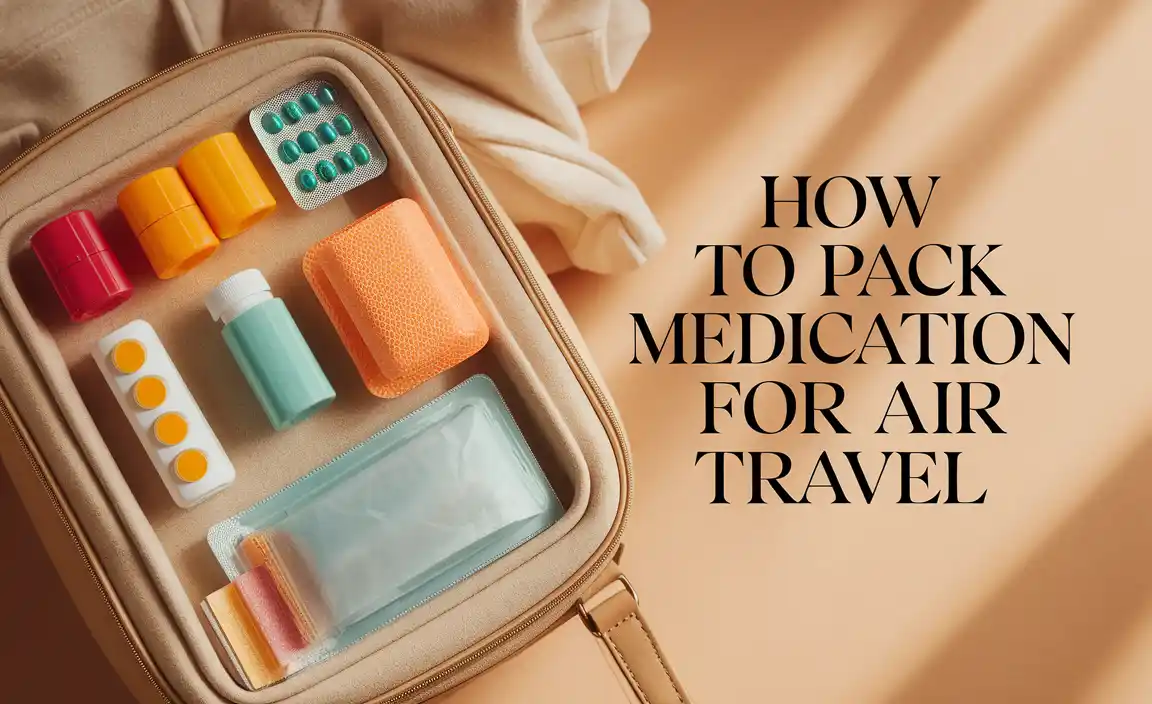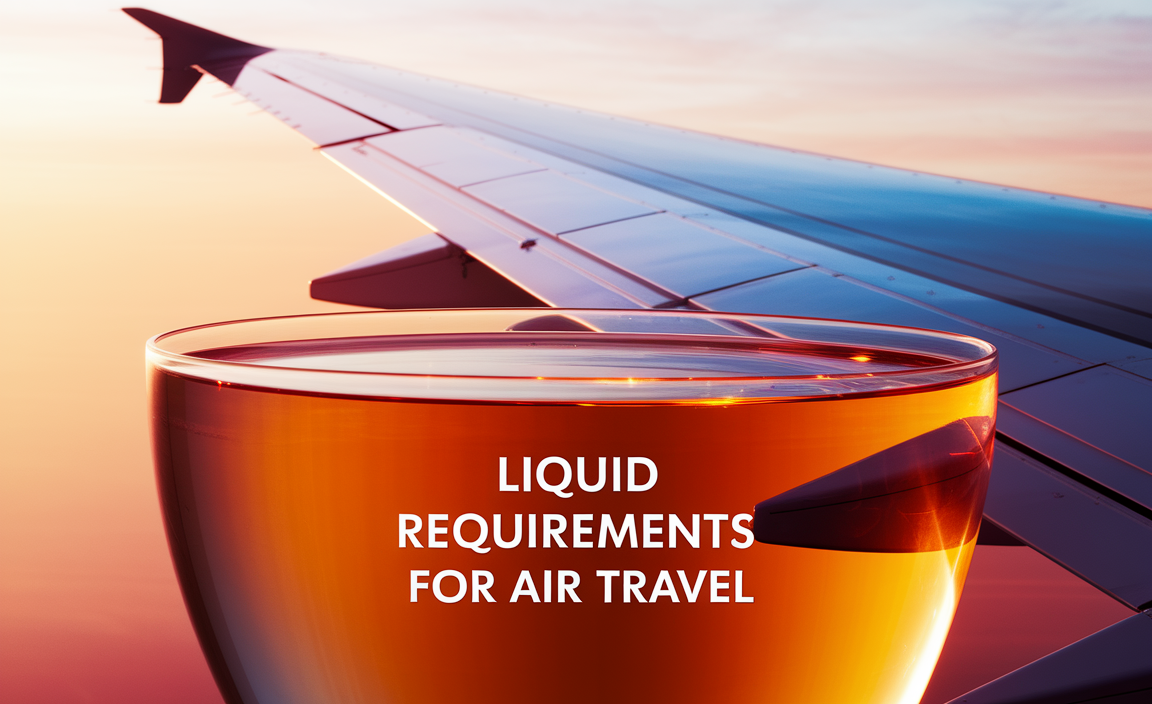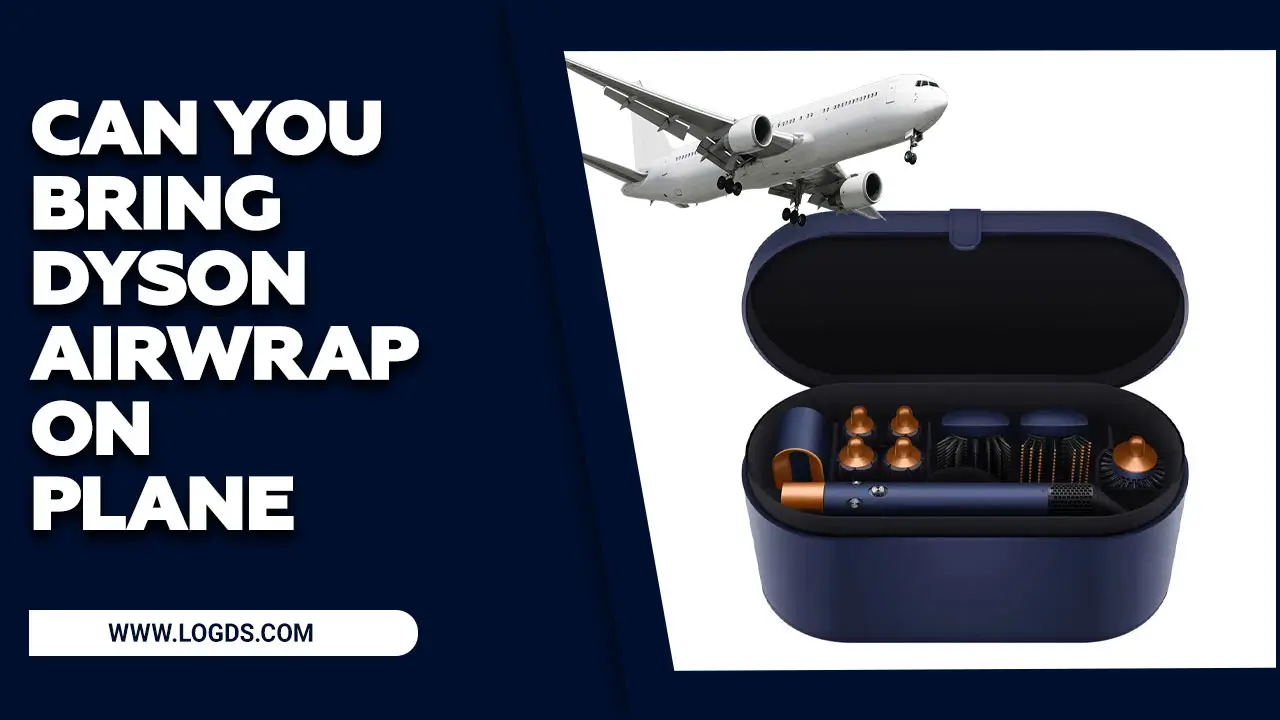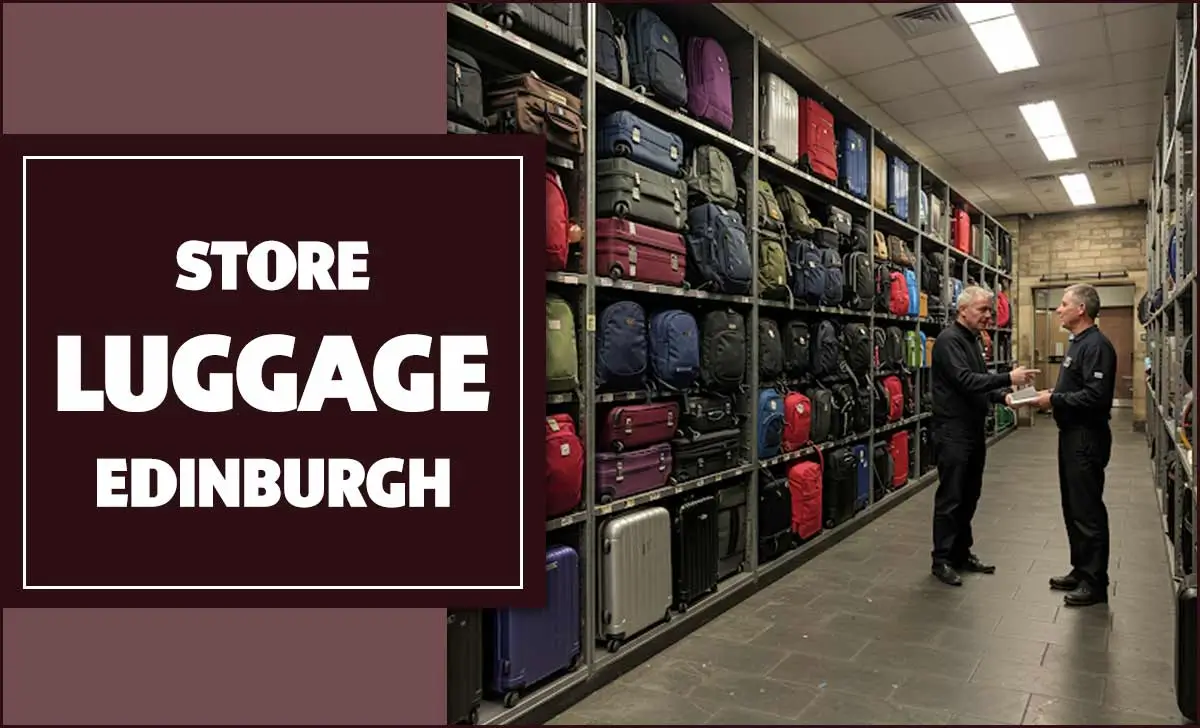Imagine getting ready for your big adventure. You’ve packed your clothes and gadgets, but what about your medicine? Packing medication for air travel can be tricky.
Did you know that not storing them right might make them less effective? Staying healthy on your trip means having your meds ready when you need them. Have you ever wondered the best way to pack them?
Maybe you’ve heard stories of folks who forgot their pills on long flights. Yikes! Ensuring your medication is safe and easy to reach is more important than you think. Let’s explore how to do it right so you can enjoy your journey without a hitch.

How To Pack Medication For Air Travel: Essential Tips
Packing medication for air travel might seem tricky, but it’s simple with a plan. First, keep meds in their original bottles with labels. This makes security checks easier. Use a clear plastic bag for liquids or gels under 3.4 ounces. Always carry your medication in your carry-on, not checked luggage. Imagine the headache of lost baggage! Don’t forget your doctor’s note if needed. Being prepared means a smoother journey.
Essential Documentation to Carry
Importance of prescription labels and doctor’s notes. Managing documents for controlled substances.
Traveling with medicine? Be sure to have papers ready. Always keep the prescription label with your medicine. This label tells others it’s your medicine. A doctor’s note helps too. It explains why you need the medicine. For special medicines like controlled substances, keep extra details handy. Here’s what to check:
- Prescription label with your name.
- Doctor’s note or letter.
- Any special permits, if needed.
These documents help others understand your needs. Keep them in your carry-on bag for easy access at the airport.
Choosing the Right Container
Suitable pill organizers and travelsized bottles. Pros and cons of original packaging versus travel containers.
When packing medication for air travel, choosing the right container is key. Consider using pill organizers and travel-sized bottles. These help keep medicines sorted and easy to reach. Original packaging has benefits, like clear labels and instructions, but is often big and bulky. Travel containers are compact and save space but could miss important info. Think about these options:
- Original Packaging
- Pros: Clear labels, dosage info.
- Cons: Takes up lots of space.
- Travel Containers
- Pros: Compact, space-saving.
- Cons: May lack labels or instructions.
How do you keep medications cool while flying?
To keep medications cool while flying, use an insulated bag or portable cooler. Airports often have long waits, so add a chill pack. Check airline rules for carry-ons to avoid trouble. You can ask the flight crew for ice if needed. Always keep medicines in your hand luggage, never in checked bags, to prevent damage.
Security Screening Process
Steps to prepare medication for security checks. Handling liquid medications under TSA’s 311 rule.
Before flying, prepare your meds for security. Use clear bags to keep items visible. Pack liquid meds under TSA’s 3-1-1 rule: 3.4 ounces max in a quart-sized bag. If you have special needs, tell the staff.
- Keep prescriptions handy.
- Label with names and dosages.
How can I travel with liquid medications?
Have proof, such as a prescription or a doctor’s note, to show at security. Pack in original bottles if possible to avoid confusion.
Ensuring Medication Accessibility During Flight
How to pack medications in carryon luggage. Strategies for inflight storage and access.
Traveling with medication? Ensure it’s accessible on your flight. Start with your carry-on bag.
- Keep your medicine in its original packaging.
- Include a copy of your prescription.
- Place it all in a clear, zip-lock bag for easy storage.
Inflight, store medications close, like under the seat.
How do I store medication on a plane?
Store your medication securely to make it easy to reach during the flight. Avoid overhead compartments in case you can’t access them when needed.
Addressing Temperature Sensitivity
Tools for maintaining medication temperature. What to do if refrigeration is needed.
Packing medication for air travel can be as tricky as playing hide and seek with a sneaky refrigerator. If your medication is like a penguin and loves the cold, a cool bag or ice pack will be its new best buddy. Make sure it’s not too cold or your meds might think it’s the Arctic. Electronic temperature monitors can also help, watching over your meds like vigilant security guards.
If refrigeration is needed, inform the airline beforehand. They’ll help you store it in the cabin—no polar plunge needed!
| Tools | Purpose |
|---|---|
| Cool Bag | Keeps medication cool |
| Ice Packs | Maintains low temperature |
| Temperature Monitor | Tracks temperature |
Storage solutions make travel smooth, even for the most temperature-sensitive meds. Remember: medications like traveling cool, not frosty!
Managing Time Zone Changes
Adjusting medication schedules for different time zones. Tips for preventing missed doses.
Flying through different time zones can confuse your medication schedule. How do you adjust? Begin by checking your new landing time. Shift your medication schedule gradually a few days before traveling. For example, if your new time zone is three hours ahead, take your pills an hour earlier each day until you match the new time.
- Set alarms to remind you.
- Use a pill organizer.
- Keep a travel log for doses.
How do I adjust medication to new time zones?
Change your dose times slowly to match the new time zone. Start three days before your trip. This way, your body gets used to the change, and you won’t miss any important doses. Plus, technology can help you stay on track. Set alarms on your phone to signal when it’s time to take your medicine.
If you’re unsure, ask your doctor for advice. They know best! Remember, keeping to your medication plan is key to feeling great during your adventure.
Handling Medication Shortages and Emergencies
Steps to take in the event of lost or insufficient medication. Accessing pharmacies and medical care abroad.
Air travel can be an adventure, but losing your medication can feel like a plot twist you never wanted. If you do find yourself in this situation, don’t panic. First, check all your bags, sometimes medicine plays hide and seek! If it’s truly gone, reach out to local pharmacies. Many countries have pharmacies that cater to travelers and might help. If a refill seems impossible, visit a nearby hospital or clinic. It’s amazing how much a little local knowledge can solve. Keep your doctor’s contact info handy, just in case!
If you’re abroad, having a plan can save you stress. Familiarize yourself with local pharmacy locations and know how to access medical care. It’s like finding a hidden level in a game—you never know when it’ll come in handy! Remember, different countries have unique rules about medications, so it’s smart to carry a translation of your prescription.
Here’s a quick guide:
| Step | Action |
|---|---|
| 1 | Search your luggage for missing medication – they’re sneaky! |
| 2 | Contact local pharmacies, some cater specifically to tourists. |
| 3 | Visit a local clinic or hospital for assistance. |
| 4 | Contact your doctor or pharmacist back home if needed. |
| 5 | Ensure your prescription is translated for clarity abroad. |
Having a backup plan for medication shortages can turn a crisis into a manageable hiccup. Being prepared makes your journey smoother and free from unexpected drama!
Traveler Tips for a Stress-Free Journey
Creating a medication packing checklist. Additional tips for travelers with medical needs.
Traveling can be fun, but planning helps. Make a medication checklist to keep everything in order. List your pills and doses. Pack them in your carry-on bag. Keep them in original containers. This way, you have your medicine no matter what.
Here are some additional tips for travelers with medical needs:
- Carry a doctor’s note explaining your condition and medication.
- Bring extra doses in case of delays.
- Know the rules on liquid medicines if you have some.
What should I do if my medicine is a liquid?
If your medication is a liquid, keep it in its original bottle and pack it separately. You may need to show it at security. Check with the airline for any special rules. Some airports might want to see a note from your doctor.
Planning helps you travel stress-free. Whether it is pills or liquids, knowing how to pack right makes a smooth journey. Be sure to follow these tips and keep your health in good hands while enjoying your travels.
Conclusion
To pack medication for air travel, use original packaging and a clear bag. Keep prescriptions handy and know airline rules. Ask an adult if unsure about liquid limits. You can label your medications for easy use. Remember these steps to travel safely and smoothly. For more tips, consider reading a travel guide or asking a pharmacist.
FAQs
What Are The Tsa Regulations Regarding Carrying Medication In Carry-On And Checked Luggage For Air Travel?
The TSA, or Transportation Security Administration, lets you bring medicine in both carry-on and checked bags. You can keep your medicine in your carry-on bag to use during the flight. There is no limit to how much medicine you can bring. It’s best if you leave your medicine in its original containers. You should tell the security officers at the airport about your medicine when you go through screening.
How Should I Pack Liquid Medications To Comply With Airline Security Guidelines?
When packing liquid medications for a flight, put them in your carry-on bag. You can take more than the usual 3.4 ounces if needed, but tell the security officers. Keep the medicine in its original bottle with the label from the doctor. Remember, it’s always good to ask an adult for help if you’re unsure.
Are There Any Specific Requirements For Traveling With Prescription Medications Internationally?
Yes, there are rules for bringing medicines when traveling to other countries. You should keep your medicine in its original container. It’s a good idea to have a note from your doctor explaining why you need it. Check the country’s rules online before you travel to make sure your medicine is allowed there. Always pack your medicine in a bag you keep with you on the plane.
How Can I Ensure The Security And Integrity Of Temperature-Sensitive Medications During A Flight?
To keep temperature-sensitive medications safe on a flight, use an insulated bag with ice packs. Check that the medications stay cold. Keep the bag with you, not in checked luggage. Inform flight attendants about the medications so they can help if needed. Always follow any special instructions from your doctor or the medicine label.
What Documentation Should I Have With Me When Traveling With Controlled Substances Or Specialty Medications?
When traveling with special medicines or controlled drugs, you should bring a copy of the prescription from your doctor. It helps to have a note explaining why you need the medicine. Keep the medicine in its original container with the label. This way, everyone knows it’s your medicine and used the right way.







